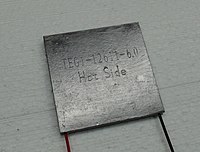
Photo from wikipedia
Pure CoSb3 and 0.1 vol% nano-SiC-composited CoSb3 were prepared by mechanical alloying and subsequent fast microwave sintering. The electrical transport properties display totally different behaviors in microwave-annealed CoSb3 and CoSb3/SiC… Click to show full abstract
Pure CoSb3 and 0.1 vol% nano-SiC-composited CoSb3 were prepared by mechanical alloying and subsequent fast microwave sintering. The electrical transport properties display totally different behaviors in microwave-annealed CoSb3 and CoSb3/SiC composites, implying their susceptibility to the preparation conditions or uncertainties. The unique microstructure including the inter-granular and intra-granular precipitates combined with high porosity of the microwave-synthesized CoSb3 and CoSb3/SiC composites lead to low thermal conductivity, which compensates the loss in electrical conductivity and results in comparable figure of merit ZT value with those reported for undoped CoSb3 from conventional method requiring high energy consumption and lengthy synthesis time. The results show that low compactness is not detrimental for the thermoelectric performance and microwave is a highly cost-effective technique for large-scale production of thermoelectric materials possessing nanostructure and low thermal conductivity. In fact, such synthesis route combining mechanical alloying and microwave annealing might be also suitable for other high performance thermoelectric materials. Actually, continuous fabrication can be readily realized in an upgraded tube microwave heating system for higher energy efficiency ratio.
Journal Title: Journal of Materials Science: Materials in Electronics
Year Published: 2017
Link to full text (if available)
Share on Social Media: Sign Up to like & get
recommendations!